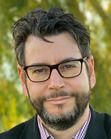From a Notebook in Vermont

View of Lowe Lecture Hall, Vermont Studio Center
Brainless with anticipation on the flight here, unable to settle on any of the books I brought: Homero Aridjis, Joseph Donahue, Ann Lauterbach, V.S. Naipaul. But the title of the last book follows me: The Enigma of Arrival.
Looking forward to the sparkling drudgery required by art. Goodbye Lake Michigan, goodbye. Midsummer, midlife. "The mid-world is best," writes Emerson. "Nature, as we know her, is no saint."

On planes I think of death though I have no particular fear of flying. The sky is undistracted reflected in Lake Champlain below.
Now I re-enter that skin I only wear when alone. Solitude, for me, is the opposite of an experience of depth. In daily life there's so much that goes unexpressed, because there's a time and place for everything. Solitude denies them both; I skate on the surface of whim.
Aridjis, The Child Poet: "As if inside a luminous sphere, I traveled within the day that brightened my room and, all eyes, would observe from bed the things that surrounded me, feeling an arousal of those things in myself."
In even the smallest airports the buzzing, blooming confusion: momentarily stranded, making connections. Bodies in space avoiding the wrong kind of collision. The wish, quite literal, to rise above these particulars.
Where did it begin: this habit of elevation, of instinctive or reflexive transcendence or avoidance of the particulars of experience? The experience of loss for Emerson was "caducous," meaning an organ shed at an early stage of development. "I grieve that grief can teach me nothing, nor carry me one step into real nature." As if grief were a moving sidewalk. In Vermont I am an aerial being among the mountains and rivers.
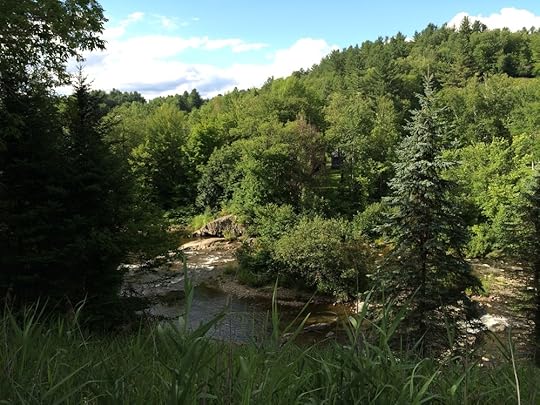
View of the Gihon River.
At dinner the residency director invites us to take time to refind the "why" of our work. But I have come here typically task-oriented, to finish the novel I've been writing since this time last year. Blue notebook squats like a toad, reminding me my first task is to finish transcribing it. In a little city of visual artists I cling to my own handwriting, the one real object I have.
I get distracted with no distractions. The scenes that I wrote on the train still have in my mind the train's rhythm. When I finish one I want to get up and walk around instead of moving on to the next. But it's raining; I return to my desk. A family of skunks plunges out and in of the long weeds ranging the riverside.
Almost missed lunch dreaming in my studio. I've never had such a thing: a dedicated space for writing. It feels a scandalous luxury. I cover a cork board with pieces of manuscript and tokens from home. The desk is already a sprawl of books, coffee mugs, papers.
The I is the lyric's baseline, the guarantee of a subjective structuring of whatever falls into or out of the poem. A first-person narrative can behave similarly. Plots and subplots serve the role of the objectivity that pressures the i to disclose what it is. That makes fiction indirect in its lyricism.
The poem makes a trance in the writer; narrative prose makes a trance in the reader.

Most of the artists here are young and childless. For the duration, I suppose that I am childless too. I pay for the privilege by becoming ever more insubstantial to myself.
Sitting and reading by the river on a cloud-stacked beautiful day. A poem comes, the first in a while, and I give it a title from Olson: "My Name Is No Race." When I read the poem in public it reminds someone of Charif Shanahan's "Wanting to Be White."
When I was much younger poetry was mostly about the freedom of association of words. I took for granted Richard Hugo's assumption that truth be made to conform to music. The reverse was reserved, Hugo said, for virtuosos like W.H. Auden. But this summer I've been rereading Auden and the experience reminds me of my experience. That is, at 45 there is more behind and beneath my words than in the days of sheer intoxication. There's a moral career for my words that demands a new courage to be simple. And the rediscovery of rhyme, which as Reginald Gibbons suggests can be poetry's via negativa, a doorway to its apophatic register. A talk by Joseph Donahue quotes Robert Duncan on the Master of Rhyme:
The Master of Rhyme, time after time, came down the arranged ladders of vision or ascended the smoke and flame towers of the opposite of vision, into or out of the language of daily life, husband to one word, wife to another, breath that leaps forward upon the edge of dying.
Donahue's talk is on "the poetics of the vertical," but another way to think of this passage is via Gibbons' notion of the apophatic versus cataphatic in poetry. Cataphasis means "to make visible"; poetry in English, claims Gibbons, tends to be cataphatic, because English's saturated lexicon makes it an Adamic language of naming. Apophasis conjures the invisible, the unseen and undone; one of Gibbons' examples comes from the Gettysburg Address: "we can not dedicate--we can not consecrate--we can not hallow--this ground." (Which hearing again makes me hear an echo of Shelley's lament in his "Defense of Poetry": "We want the creative faculty to imagine that which we know; we want the generous impulse to act that which we imagine; we want the poetry of life; our calculations have outrun conception; we have eaten more than we can digest.") French and Russian are friendlier to apophasis. Francis Ponge, as Gibbons notes, is a curious exception to the rule of a tradition obsessed by l'azur or what Yves Bonnefoy calls "a crystal sphere."
Of course what Duncan and Donahue mean by "vision" is probably precisely the apophatic; the visible world is a fallen one of apocalyptic "smoke and flame towers." But Duncan's image comes from Exodus; the pillars of smoke and flame guide the Israelites out of Egypt, like vertical hyphens between the social and divine. I prefer to travel the paths of the implicit chiasmus between vision and the opposite of vision; between a saturated poetics of naming and the pressures (pleasures?) of the void.
Fiction seems very clumsy to write after reading the poems of Joseph Donahue, particularly the long title poem of his recent book Red Flash on a Black Field. Seemingly without effort from line to line and section to section he evokes worlds and narratives, colliding with easy precision encounters of the sacred and profane. Landscapes rhyme with one another, toggling implicitly between vision and its opposite:
A desert above a river,
a heaven beneath a mountain.
...................
A lake beneath the desert,
grain in a field above a cloud.
A flaw drains light from a dog run.
The mud is a treble of mutts.
One ear hears the gentle stillness of the night,
the other hears troops take a beach.
Together, ears hear the sound of men
singing "Dear Father," though
clearly not in English.
Childlike, the Vermont landscape. I've landed in the Shire.

The shepherdess weds her sheep in a miniature pastoral drama, courtesy of Bread and Puppet Theater.
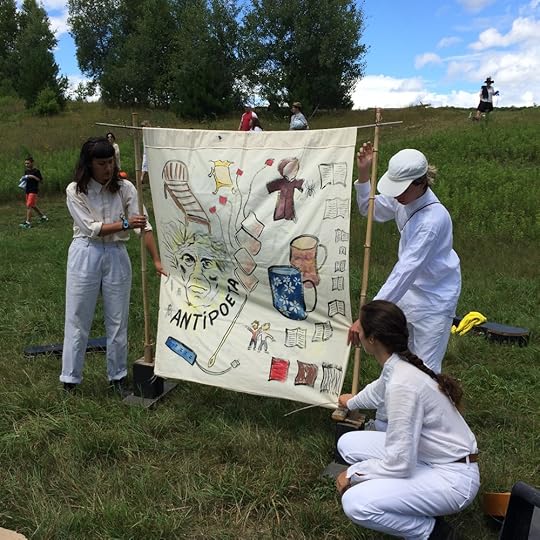
Nicanor Parra makes a surprise appearance.

The man with the sky in his eyes.

As above, so below: the Pageant.
River, birdsong, stuttering hedge-trimmer.
"True Love Waits" moves me to tears. To keep faith with those who abandon you. Radiohead is a complete theology.
Small panic every morning at the finitude of this. River of sky above me, heaven of waters below.
Dreams of the blue notebook, taunting me with its endless pages. I want the feeling of finishing, though it's only the breaking of surface tension. Apres ça, la déluge.
The best part of any story is the down-time, when the machine of plot ticks to itself in the background and the characters get to know each other. Richard Linklater's entire career based on capturing that experience.
A poetics of digression weaves easily between the named and the ineffable.
Trying to finish a novel feels just like those dreams where you're trying to run but your legs are too heavy to move. In dreams I'm being chased; in writing I'm doing the chasing. The experiences are almost the same.
An idyll has to end; ending is in its nature.
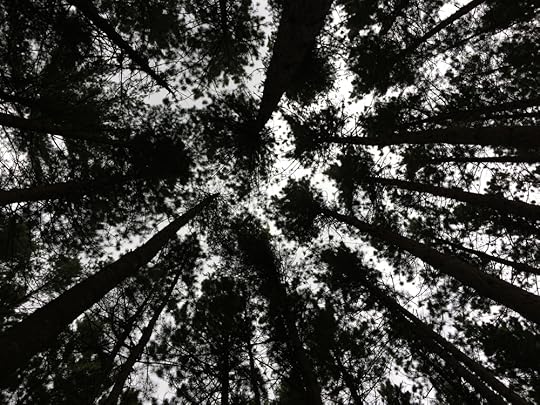
Peter Turchi: "Diner is essentially a remake of The Canterbury Tales."
The concept of "curated digression."
Finished transcribing the blue notebook, robbing it of talismanic power. The printout of the draft sits massively on my desk; it has a dimly charismatic glow. I try to take pride in its objecthood. But a novel has a weak existence except when someone's actually reading it.
Cool humid breeze. Lush green. Trees and cascades of wind. Herding cumulus clouds. The earth apparently unruined.
Sense of place often richer than character.
The livelong day.
I write a second poem. Novels are so Protestant and middle class, presenting a horizontal quantitative earthliness. It takes poetry or science fiction to pursue the hubris of cosmology, the vertical.
But is the vertical or apophatic more than a gag reflex, a mighty sublation of disgust? With bodies, the sordid push, mortality?
[image error]
"Too fucking pretty": an artist's notes to herself.
Solitude edges into loneliness and back again. Sunday noon on the lawn overlooking the riverbend, keeping company with the clock tower and clouds, in a circle of wooden chairs shaped for last night's revelry. Solitude is concentration of force and loneliness is its opposite.
For the other residents here I'll always be the guy who talked-sang "Piano Man" on karaoke night, half Billy Joel, half William Shatner. It's taken all my life to become a little at ease with my own uncoolness.
"My Name Is No Race." Race sticks in the craw of the vertical, or else gets appropriated into its service; what is white supremacy but an organized effort to transcend the impure conditions of mortality? The black gospel choirs that turn up in white pop songs. We danced to "Like a Prayer" last night.
A problem you can dance to.
Some fundamental tension goes missing when I try to write the personal.
Eros floats free in places like this and it isn't necessary to do anything about it. We pass lightly among each other. We touch hands, voices, glances.
A third poem; hard not to feel that each has been a falling off from the first and best. So much paper left behind recording a fraction of all I've expressed. Condensare, signore.
A place like this cuts off adulthood at the knees. When the visiting artists bring children, it's a gentle shock of mild surprise. My daughter like so much of my life is going on without me.
Why are cumulus clouds charismatic? They are so palpably in three dimensions. Flatter or more dispersed clouds don't challenge our impression of the sky as an entirely virtual space.
Poetry like breathing when I'm so little interrupted. I interrupt myself: why?
Frantic white butterfly hurries on and off the stage. Its mind must move faster than mine if it ever experiences any peace.
Clouds in the north grow black bellies.
Global warming makes more palpable the distinction between the real laws of nature and what it turns out was only habit. To put things another way: fate is not to be fucked with.
Saints I seem to need: Proust and Woolf and Joyce. Saints not by personal virtue but by example of their devotion.
I can't seem to think of any poet-saints; they are too close to the medium of devotion, language.
What is it I mean? That the saints, like angels, are in exile, from Ireland or London or good health. Across the river I see three sculptors in a circle consulting their cell phones.
Poets are outrageously at home. It's offensive to the rest of us camped down under the bridges of language.
Sunshine. I have to close my eyes for an understanding of its radiance.
And though it makes me feel shy to say so, I make overtures to something like truth.

I mean things in a new way. A statue commits to its pose and to enduring all the elements of time. I'm in friction; one part good as another. Emerson: "I have not found that much was gained by manipular attempts to realize the world of thought."
Lumping through the manuscript line by line. The book that I imagined is superior in every way to the book that I've actually written. But only the latter does me the courtesy of really existing.
Chomsky claims somewhere that what distinguishes human language from animal communication is that language enables thought; we can't think without words. We communicate first with ourselves. Seems a poetic principle. Whether we speak of the visible or the invisible, we first speak the phatic, the languageness of language, the open channel itself: "Is this thing on?" A precondition for thinking is literally talking to yourself.
Shade of gray-green leaf that stuns silver in sunlight only by contrast to the more ordinary green of its reverse. Quaking steel green, aspen silver green. Fascination of a bright foreground and a black background or the reverse. When you take a cell phone photo your finger chooses between definition of the objects or the lush transcendence of the sky. What Vera Pavlova in a talk calls the "incoherency of space."
The prospect of leaving, the idea of staying: flip sides of the coin of melancholy. Give it a toss, I'm finished here.
The last line in my notebook is this sentence: "I could take a nap."
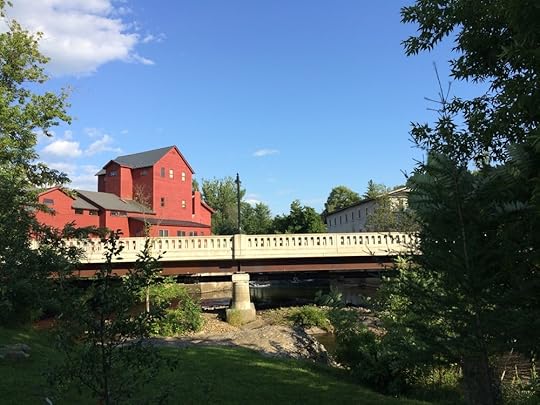
The Red Mill at VSC.

